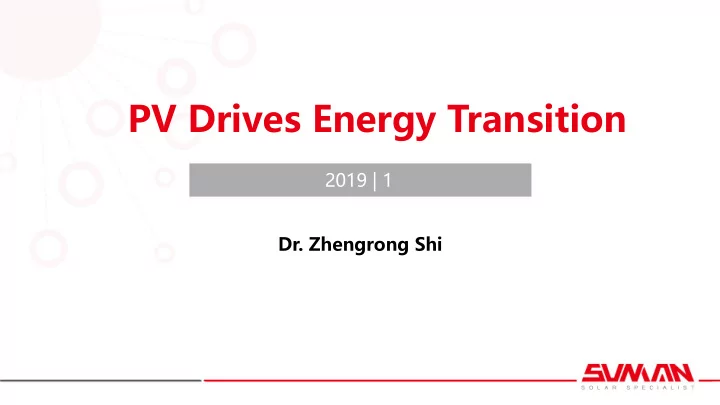

PV Drives Energy Transition 2019 | 1 Dr. Zhengrong Shi
Features of Energy
Conventional Energies Resources depletion CO 2 emission
Controllable Nuclear Fusion —— Disruptive Technology
What is available now?
Cost vs Capacity
Roller Coaster of Solar Policy change ➢ Oversupply ➢ Trade barrier ➢ Material supply ➢ Financial crisis ➢
Emergence of Grid Parity
Virtual Power Plant with Solar and ESS
Global Renewable Energy Grids
Reduction of Intermittency with Trans-regional Solar Grid
Polysilicon ⚫ Number of polysilicon rod per CVD reactor increase from 12, 24, 36 to 48 ⚫ Power consumption reduce from250kWh/kg to 42kWh/kg 12 Polysilicon rods(SINOSICO) 48 polysilicon rods(Asia Silicon) Ratio of surface area to volume of CVD reactor
Silicon Rod, Ingot and Wafer Production Capacity of Material Input of Thickness of Consumption Monocrystalline Silicon Muticrystalline Silicon Wafer of polysilicon Growing Furnace per Casting Furnace Month 10 g/W 300 μ m 0.45t ( G5 ) 200 μ m 4.5t 180 μ m 6 g/W 1.1t ( G7 ) 2.7t 0.5t 150 μ m 1.5t ( G8 ) 3 g/W
PERC Capacity
Roadmap of Cells and Modules Power of Module ( 60 cells ) Power ( W ) Module Type Multi + additive 270 Multi + RIE 270~275 Mono 280~285 Multi +RIE+PERC 285~290 Multi + RIE + PERC+ Half Cell 290~295 Multi + RIE + Half Cell + MBB 295~305 Mono +PERC 300~310 Mono + PERC +Half Cell 310~320 Mono + PERC + Half Cell + MBB 325~335 N type + PERC + Half Cell 315~320 N type + Shingling >330
Modernizing PV Equipment
PV Applications
PV is One of the Highlights in China
Conventional Solar Panel Weight of panel= 20 kg Weight of cell= 0.72 kg Thickness of panel = 40 mm Thickness of cell= 0.5 mm
An Innovative Module Structure Optics Insulation Mechanical Durability Performance Accreditation Easy installation Aesthetics Safety Recycle
Solar Roofs
Solar Facade
Solar Tiles
Solar Sunshades
Solar Household
Solar Carports
Solar Powered Automobile Solar Car with 422 cells (125mm, 1.3kW ) ⚫ Average irradiation=3.0 kWh/m 2 /day Average power generation=2.1 kWh/day Drive distance= 36 km/day
Solar Powered Automobile Solar car can reduce 64% CO 2 emission. ⚫
Mini-Solar Power 63mm 3 mote with a optics chip containing a Smart dust mote with sensor optical receiver, passive and active optical CCR for communication, a CMOS ASIC for transmitters, and power source control, and a battery for power.
Beta Voltaic Solar cell vs nuclear battery Radiation type
Beta Voltaic Penetration of rays ⚫ Radiation Radiation Half-life Time to 10 % initial Max. energy Avg. energy source type (year ) activity ( year ) ( keV ) ( keV ) 3 H β 12.3 36.9 18.6 5.7 63 Ni β 100.2 300.6 66.9 17.4
Beta Voltaic Nuclear battery Pacemaker Power supply of sensor Device with nuclear battery Military battery Consumer electronics
Recommend
More recommend